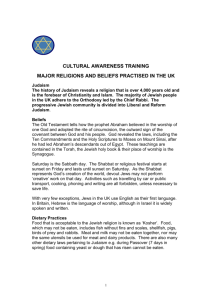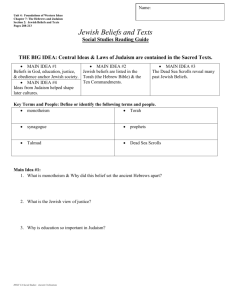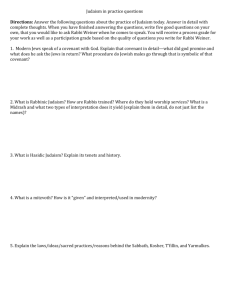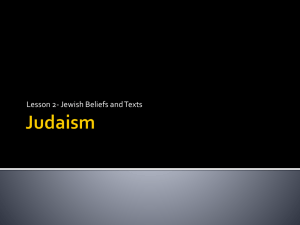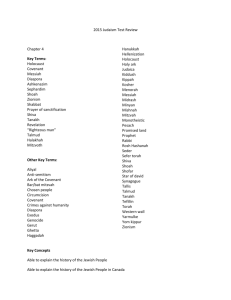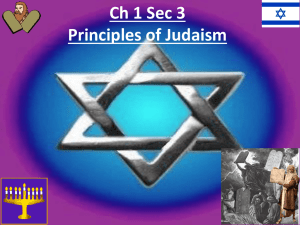Engagement Paper-Judaism
advertisement
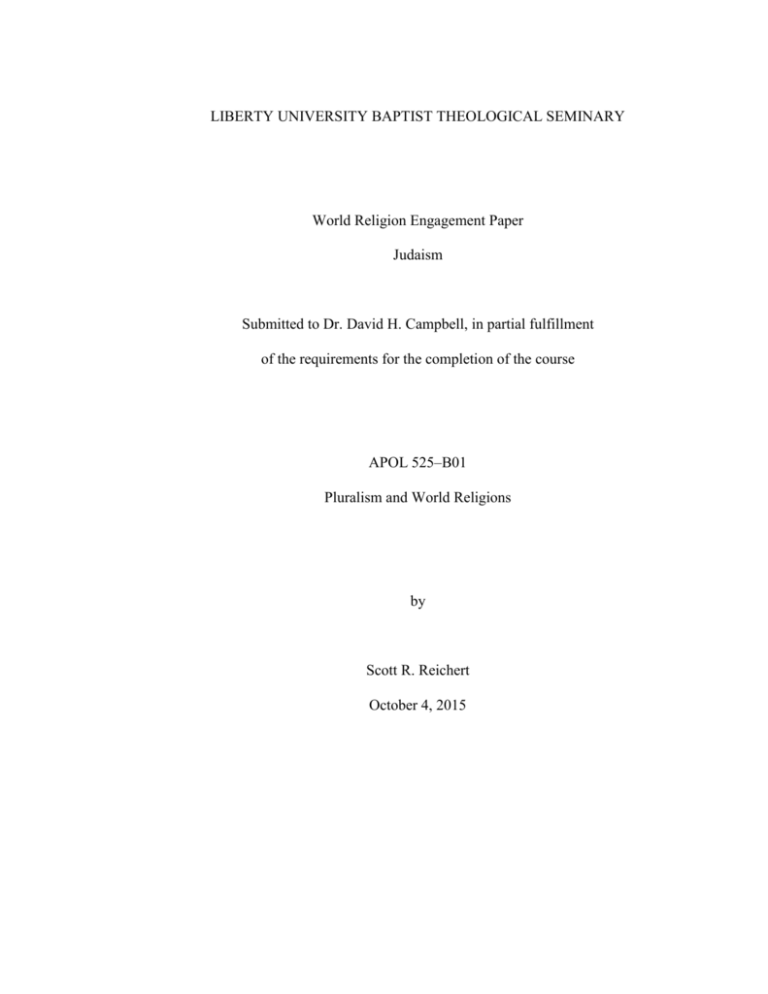
LIBERTY UNIVERSITY BAPTIST THEOLOGICAL SEMINARY World Religion Engagement Paper Judaism Submitted to Dr. David H. Campbell, in partial fulfillment of the requirements for the completion of the course APOL 525–B01 Pluralism and World Religions by Scott R. Reichert October 4, 2015 Contents Contents ........................................................................................................................ ii Introduction ................................................................................................................... 1 Theological Judaism ..................................................................................................... 2 Etymology ................................................................................................................. 2 Basic Tenets .............................................................................................................. 2 Torah - The Law ....................................................................................................... 3 Practical Judaism .......................................................................................................... 5 Sharing the Gospel with a Jewish Audience ................................................................. 6 The Interview ................................................................................................................ 7 Introduction ............................................................................................................... 7 The “Meat” Of the Interview .................................................................................... 8 The Evangel .............................................................................................................. 9 Conclusion .................................................................................................................. 10 Bibliography ............................................................................................................... 12 ii WORLD RELIGION ENGAGMENT PAPER – JUDAISM Introduction Judaism is a unique religion and can seem foreign to those from the Christian community. For this project, I chose to interview an adherent to this religion. I would have liked to attend a worship ceremony also. However, finances did not provide for it (I will follow up on this later). As I alluded to in a previous discussion-board post, I had attempted to bring the evangel to this person in the past. I was met with polite, yet nervous laughter that left me befuddled at the time, but now completely understand in light of Corduan’s text. I had made the error that many Christian’s make in understanding this religion: understanding it within the light of Christianity. Judaism is completely different in its essence. The interview revealed several things to me, which I intend on sharing in this paper: (1) Judaism is not a missive religion; it is not actively trying to convert people to Judaism.1 (2) Judaism is not a salvific religion; Jews are not trying to achieve salvation.2 (3) Judaism is not just about religion; it is also a heritage.3 A note about methodology: Considering that this paper was based upon an informal interview with a friend that asserts to be Jewish, I will present it in a somewhat conversational manner. In the first section, I will present a ‘textbook’ overview of Judaism. In the second section, I will address the idea of the Jewish folk-religion. Thirdly, I will provide an outline of a 1 J. Julius Scott, Jewish Backgrounds of the New Testament (Grand Rapids: Baker Academic, 1995), 2 Ibid. 273. 3 Winfried Corduan, Neighboring Faith,. Second Ed. (Downers Grove, Illinois: Intervarsity Press, 2013), 88. Kindle Edition. 1 2 meaningful approach to sharing the gospel with a Jewish audience. Finally, I will address the aforementioned three points, as it pertains to the interviewee, Ms. Barron. Theological Judaism Etymology The Jewish religion of modern day did not exist prior to the intertestamental period. The word Jew, biblically speaking did not occur until the post-exilic period in 586 BC. Judaism went through a metamorphosis from intertestamental, rabbinic, medieval, and has finally settled into the current three variations, Orthodox, Conservative, and Reformed (this is also the order of liberalistic ideation). This is not to say that the Old Testament Israelites and modern Judaism are separate religions, they are not. The core beliefs have remained the same.4 Basic Tenets There are three basic tenets of Judaism, through Old Testament Judaism, intertestamental Judaism, and contemporary Judaism. These are monotheism, covenant, and law.5 These three concepts are shared with the other two “sister” worldviews, Christianity and Islam. However, the Jewish application is distinctive.6 The Jews concept of God is similar to what Christians understand. He is a omnipotent, omnipresent, unchanging being. Judaism does not identify God with a Trinitarian 4 M R Wilson, "Judaism." In Evangelical Dictionary of Theology, by Walter A Elwell, 637-638, (Grand Rapids, Mi: Baker Academic, 2001), 637. 5 Scott, Jewish Backgrounds, 266. 6 Ibid., 273. 3 understanding, and does not recognize Jesus as a deity in any way. Although the Old Testament looks to a messiah, the Jewish thought of a suffering messiah is not an easily accepted idea. The idea of covenant is sacrosanct. Although Christian’s have a belief in covenant the Jews hold this idea to a much higher standard. They believe that they are God’s chosen people as delineated by the Abrahamic covenant and furthered through the Mosaic.7 Because of this, the Jewish people see no need for salvation. They are already saved by virtue of the covenant.8 This brings us to the next very tightly interwoven pillar, the Torah, or law. If there is no need for salvation, then the next question that jumps to the Christian mind is, “then why should Jews obey the law?” I like the analogy that Corduan uses to demonstrate the answer to this question. Corduan relates this as an immature viewpoint. This question assumes that the only reasons to follow rules are to either expect reward or avoid punishment. Corduan relates this to a teenager who has progressed out of adolescence and, as a college student, has matured morally to the point that they comply with their parents’ wishes out of respect, love, and dedication. Similarly, Corduan posits that the motivation within Judaism is to follow the Torah in order to display love and respect to their God.9 Torah - The Law The Torah was handed down by Moses in the first five books of the Old Testament. Much of this comes from Leviticus. It can be very complicated. In fact, Paul mentions in 7 Ibid., 273 8 Ibid., 273.; Corduan, Neighboring Faith, 62, kindle edition. 9 Corduan, Neighboring Faith, 62, kindle edition. 4 Galatians 3:10-13, that the Law is impossible to follow, that it was put into place to show man his shortcomings.10 The entirety of the Law is outside the scope of this paper. I will simply give a brief overview. There is a prescription of dress that includes a head covering, side curls, and a tzitzit (an undergarment that has fringes on it). Generally, Jews dress in everyday street clothes. However, the Hasidim may sport white shirts, a long black overcoat, and a large brimmed hat. There are dietary restrictions known as kosher laws. This may even include a period of time between when one may eat meat and a dairy product. Next, there is prayer time. This is required three times a day.11 There is a place of worship, either a synagogue or a temple depending on whether one is reformed or not (Reformed Judaism does not believe in the rebuilding of the Temple in Jerusalem and therefore believes the Temple should be where one lives.)12 There is a definitive four phase maturation process within Judaism, birth (circumcision), puberty (bar [bat] mitzvah), marriage (glass crushing [not sure of this etymology]), and death (reading from psalms - looking for resurrection). There are also special holy days. These include: Rosh Hashanah (New Year), Yom Kippur (Day of Atonement), Sukkoth (Feast of Booths), Simhat Torah (Celebration of the Torah), Hanukkah (a feast celebrating the purification of the Temple), Purim (celebration of the events recorded by Queen Esther), Passover (God’s protection just prior to the exodus), and Shavuot (Pentecost).13 10 D.A. Carson and Douglas J Moo, An Introduction to the New Testament (Grand Rapids: Zondervan, 11 Corduan, Neighboring Faith, 78-82, kindle edition 12 Ibid., 77. 13 Ibid., 82-88. 2005), 457. 5 The necessity of following the Law varies depending where on the liberal spectrum you sit. Orthodox requires strict adherence to the law including leaving electrical devices off and not answering the phone on the Sabbath.14 However, Reformed Judaism does not require any adherence to the Law. Although it is not required, it is not banned either. Reformed Judaism is in a constant developmental flux as it attempts to assimilate into a constantly adjusting society.15 Practical Judaism This previous discussion is concerning the inside knowledge of Judaism, as portrayed by people “in the know,” with expert knowledge to the mythology, and ritual. “On the other hand, the religion of the common people tries to find its way apart from intensive training in practice and scripture. This is how folk religion develops. Folk religion consists of the lived, everyday practice of religion by common laypersons.”16 This brings us to probably one of the foreign elements of Judaism to a Christian audience, the Jew that is not Jewish, a secular Jew. One aspect of Judaism that is different from Christianity is the idea of heritage.17 In Christianity, one must make a personal commitment to Christ to enter into the fold. One may be born in a Christian home, raised as a Christian, Even go to Christian educational institutions. However, without the personal commitment, this person is not considered a Christian. Judaism is quite different; if one is born to a Jewish woman, one is Jewish.18 We even find an example of this in the New Testament. 14 Ibid., 87. 15 Ibid., 77. 16 Ibid., 48. 17 Ibid., 88. 18 Ibid., 87. 6 When Paul is travelling to Lystra and Derbe in Acts 16:3, he has Timothy circumcised, even though he has a gentile father. This seems counter-intuitive to Paul’s tenet of sola fide. However, it is not, precisely for the reason of Timothy’s Jewish heritage. We find in 2 Timothy 3:15 that Timothy had a Jewish mother and was raised as a Jew; his father would not condone the circumcision. This left Timothy, and likewise Paul, in a difficult situation when witnessing.19 Timothy could have been considered a secular Jew, by his heritage, not the religious orthodoxy. A final note of this section, “Even Jews who do not practice the Talmudic obligations cherish their legacy.”20 Sharing the Gospel with a Jewish Audience I learned much from Corduan’s section concerning this. As Corduan espouses, I thought I knew Judaism because I had a strong working knowledge of the Old Testament. I was wrong. I assumed, as Corduan mentions, that Jews were simply deficient Christians who had just rejected the idea that the messiah they had been waiting for was Jesus. I also rejected the idea of a Jewish heritage; my reasoning was that Judaism was not a race, it was a religion. Ironically, I tended to offend those that I was trying to save. The Jewish people for centuries have been oppressed by various cultures. Conversion has usually gone hand in hand with this oppression. For this reason, Jews are extremely wary of any intention to convert them.21 Corduan suggests showing the people you are evangelizing their 19 , Thomas D Lea and David Alan Black, The New Testament: Its Background and Message, second ed. (Nashville: B&H Academic, 2003), 311; Carson and Moo, An Introduction to the New Testament, 295. 20 Corduan, Neighboring Faith, 88, kindle edition. 21 Ibid. 7 need for a messiah by using common ground. Discuss common problems and shortcomings and discuss Jesus as the savior that takes these sins away. Corduan also points out that identifying Jesus as the awaited messiah could help with this situation. Most importantly, however, is the idea that accepting Jesus does not alter ones Jewish identity, but rather enhances it as a completed Jew.22 I would personally take this one-step further, particularly when talking to a reformed or even a conservative Jew. Many Jews have heard this argument before. They reject it out of hand as being anti-Jewish. However, if one were to show an evolution of change from Old Testament through intertestamental, orthodox, conservative, and finally, reformed, then accepting Christ as the next step in the developmental process may be an easier leap. Additionally, Paul uses a powerful apologetic in Galatians against the Judaizers. Paul relates the foundation of the Jewish religion in the faith of Abraham and demonstrates how the Law was provided as an indicator for the coming of the messiah, not as a replacement for faith.23 The Interview Introduction When earlier I referenced the mistakes I made sharing the gospel with other Jewish people, Ms. Barron was one of those people. Although she was gracious, I could tell she was reticent to hear my exhortations at the time (this was a few months ago). An aggressive evangelical stance is not prudent. Therefore, I approached this opportunity in a completely different manner. I know Ms. Barron from another association apart from religion. This gave me 22 Ibid., 88-90. 23 Carson and Douglas J Moo, An Introduction to the New Testament, 457. 8 the opportunity to approach her with this project. I invited her to dinner so that I could interview her for this paper. I assured her this was not any kind of quiz to find out what she knows about her religion, and I did not intend to convert her. I simply told her I wanted to find out what being Jewish meant to her. Ironically, this request was the day before Yom Kippur. I was excited that perhaps I could attend services. She informed me, however, that all tickets had been sold out and even if they had not, the cost was prohibitive. I found it troublesome that cost was an issue when attending worship services. Later in the interview, the issue of money was raised again. Ms. Barron informed me that some temples require members to submit a percentage of their income (in excess of a tithe) in order to attend. She even related a story that while she was searching for the right temple she was told talking to the rabbi this time was okay. She was permitted three free sessions. Apparently, this is a commonplace facet of worship [This is almost a taboo issue in the Christian church]. The “Meat” Of the Interview She classified herself as following the reformed tradition. Although, this school is very liberal in its legalism, she had very little understanding of scripture at all. Additionally, she did not identify with any particular deity (more on this later). Particularly because of this last point, I discovered that Ms. Barron’s primary association with Judaism, could well be classified as what was previously discussed as a secular Jew. She described a Jewish heritage growing up. Both of her parents were Jewish. They celebrated the holidays. She was aware of the names and general occasions of the holiday, but did not celebrate them in an orthodox manner. During this time, they did not eat pork, but did not follow the other kosher laws. She did learn Hebrew and 9 celebrated a bat mitzvah. Her family did not study scripture. She raised her children in much the same manner. When asked why, the reason given was primarily to pass on the Jewish heritage, to please and respect her parents. The Evangel It is here that I was given an opportunity to share the gospel. During this interview, I asked Ms. Barron what her concept of God, and the afterlife was. She honestly answered that she did not know. She expressed that it was something that she had not thought much of until recently. She asked me what mine was and this allowed me to witness to her. I gave her a brief chronology of my path into the Christian faith. Our association was through a self-help group we both attended. It was obvious that we shared common experiences (troubles) and I was able to relate how Christ was resolving them for me through sanctification. I was able to share that I had received this epiphany through the program we were both in, not all at once, but in small pieces over time. I knew I had shortcomings; I knew I was not a perfect person; I had made many mistakes, particularly in relationships [this was knowledge she already had]; I related how Christ’s sacrifice was free through faith alone. I related how reliance on this has given me much more serenity than I have ever had. I was also given the opportunity to show how believing in Christ was not the end of her Jewishness, but the completion of it. She seemed open to this line of thought. At the conclusion of the interview, I asked Ms. Barron, “What would it take for me to get you to believe this?” This was not a helpful question. Ms. Barron expressed that she did not like the question. She explained that it touched a nerve, but would not explain further. Later in 10 the evening, after the meeting we attended together, I was able to rephrase the question in a manner that was more acceptable to her. Apparently, her brother had converted to Christianity. He was very aggressive about converting her. She felt as if it was being rammed down her throat constantly. I have never found this to be an effective apologetic. I asked her, “What would it take to convince you that what I have to say is true?” Her answer, “Proof.” This was good news indeed. It was my initial dilemma also. Which is what led me to apologetics. Throughout my upbringing in Roman Catholicism, I was chastised for asking too many questions. I was told to just believe, through faith. This was not an acceptable answer to me. Fortunately, through my spiritual awakening, I was open to listen to more on the subject. I found out that Christianity was evidential. Because of this evidence, I reasoned that Christianity was true. I only had a few moments to express this to her. I did so in this manner: (1)There was a man named Jesus, (2)This man claimed to be God, (3) He was crucified (to death) by the Romans, (4) He was resurrected. It therefore, is good evidence that he was in fact God. She agreed that this seemed like a logical progression, but the resurrection part needed evidence. This is where the discussion ended. She did state that she was open to further discussions. I also expressed interest in learning more about Judaism, perhaps by attending a service or two. She also offered her assistance for me to learn Hebrew. Conclusion Judaism has a wide range of beliefs and practices. The secular Jew, in particular, is a foreign concept to the Christian. This experience has taught me that an assertive evangel will not be taken well. The best approach is to accept the Jewish heritage that is very much a part of this culture. Relate to the Jewish person’s common humanity. Present Christ in a manner that 11 exemplifies his saving us from our sins. Do this in a way that expresses Christ as completing their Jewishness and not defeating or removing it. 12 Bibliography Barron, Lois, interview by Scott R Reichert. (September 24, 2015). Carson, D.A., and Douglas J Moo. An Introduction to the New Testament. Grand Rapids: Zondervan, 2005. Corduan, Winfried. Neighboring Faiths. Second Ed. Downers Grove, Illinois: Intervarsity Press, 2013. Lea, Thomas D., and David Alan Black. The New Testament:Its Background and Message. second. Nashville: B&H Academic, 2003. Miles, Todd L. A God of Many Understandings. Nashville: B&H Publishing Group, 2010. Scott, J. Julius. Jewish Backgrounds of the New Testament. Grand Rapids: Baker Academic, 1995. Wilson, M R. "Judaism." In Evangelical Dictionary of Theology, by Walter A Elwell, 637-638. Grand Rapids, Mi: Baker Academic, 2001. Word Count = 2,733
